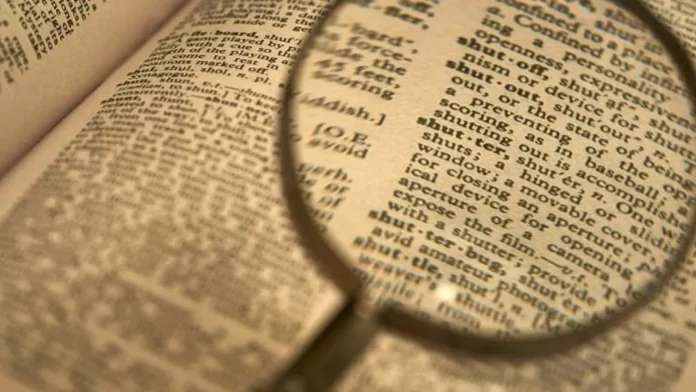Dictionaries are often seen as humble reference books, quietly sitting on shelves or hiding behind digital screens. Yet, their role in our lives is far more profound than we might realize. Beyond mere collections of words and their definitions, dictionaries are the portals to understanding language, effective communication, and the preservation of our linguistic heritage. In this article, we will explore the profound significance of dictionary meanings and how they underpin our ability to comprehend, communicate, and connect with the world of words.
I. Defining the Definers: The Role of Dictionary Meanings
A. Clarity and Precision
The primary purpose of dictionary meanings is to provide clarity and precision in communication. Language is a system of symbols, and the definitions in a dictionary are the keys that unlock these symbols accurately. Without well-defined terms, language becomes a labyrinth of ambiguity and misinterpretation.
Consider the word “run.” In different contexts, it can signify moving swiftly on foot, managing an organization, or a sudden series of events. Dictionary meanings are the guiding lights that lead us to the right interpretation, ensuring our thoughts are expressed clearly and understood by others.
B. Language Learning and Enrichment
Dictionaries are invaluable tools for language learners. Whether you are studying a foreign language or seeking to expand your vocabulary in your native tongue, dictionaries offer essential resources. They do not merely provide definitions; they include pronunciation guides, usage examples, and synonyms and antonyms. These features make the learning process more accessible and enjoyable.
Expanding one’s vocabulary becomes an exciting journey with the help of dictionaries. Writers, poets, and speakers use these resources to discover new words, explore their nuances, and convey their thoughts with precision and eloquence.
II. Unearthing Word Histories: Etymology and Beyond
Dictionaries are not static collections of words; they also offer windows into the history and evolution of language. Etymology, the study of word origins and development, is a captivating field of linguistics that provides profound insights into how words have evolved over time.
A. Tracing Word Origins
Etymology allows us to trace a word’s roots and understand how it has evolved over centuries. For example, the word “enthusiasm” traces its roots to the Greek “enthusiasmos,” meaning “inspired or possessed by a god.” Over time, it has evolved to represent fervent or intense passion. Exploring etymology deepens our appreciation for the intricate journey of linguistic evolution.
B. Cultural Significance
Etymology isn’t just a linguistic curiosity; it provides cultural insights as well. A word’s origin often mirrors the historical, social, and cultural contexts in which it emerged. Words borrowed from other languages reveal cultural exchanges, while changes in meaning over time can unveil shifts in societal values and norms.
III. Dictionary Meanings in Everyday Life
The significance of dictionary meanings goes far beyond academic or linguistic pursuits; they are integral to our daily lives.
A. Effective Communication
Effective communication is fundamental in personal relationships, professional interactions, and virtually every aspect of life. Clear and precise language, grounded in dictionary meanings, ensures our ideas are expressed accurately and understood by others. Shared definitions create a common language that minimizes misunderstandings and conflicts. Get more details on the dictionary meaning of whaps here.
B. Decision-Making
In a world flooded with information, individuals make decisions every day. Whether it’s selecting the right words in a business proposal, interpreting legal documents, or following medical instructions, dictionary meanings guide us in making informed choices. In these situations, the meaning of a single word can have significant consequences.
C. Creative Expression
Writers, poets, artists, and creators of all kinds rely on the power of language to express their thoughts and emotions. Dictionary meanings provide a rich palette of words, each with its unique connotations and subtleties, enabling artists to craft their messages and tell their stories. From the timeless prose of Shakespeare to contemporary novels and films, dictionaries serve as invaluable companions for artists perfecting their craft.
IV. The Evolution of Language and Dictionaries
Language is dynamic and continuously adapts to reflect the changing world. Dictionaries, too, must evolve to keep pace with the ever-changing language. This process includes the inclusion of new words, updates to definitions, and revisions of language standards.
A. Incorporating New Words
Language is a living entity, constantly absorbing new words and expressions. Technological advancements, global cultural interactions, and societal changes contribute to the emergence of neologisms. Dictionary compilers, such as those responsible for the Oxford English Dictionary, regularly update their entries to reflect these linguistic shifts.
B. Expanding Definitions
Words are not static; their meanings can shift or expand. For example, the word “cloud” once primarily referred to a visible mass of water vapor in the sky. In the digital age, it has come to signify a virtual space for data storage and processing. Dictionaries capture these shifts in meaning, ensuring their continued relevance.
C. Preserving Languages
Dictionaries also play a crucial role in preserving languages, particularly those at risk of extinction. Indigenous languages, regional dialects, and historical forms of speech are documented in dictionaries, helping to safeguard their legacy for future generations.
Conclusion
Dictionaries are more than reference books; they are vital tools for unlocking the beauty of language. Dictionary meanings provide clarity, precision, and historical context, enhancing our ability to communicate effectively and appreciate the ever-evolving richness of language. As we navigate a world filled with words, a dictionary remains our trusted guide, helping us decipher the labyrinth of human expression and understanding. They are not just books but the keys to unlocking the secrets of language and the vast world it represents. In a world teeming with words, dictionaries are our compass, guiding us through the intricate maze of human expression.







